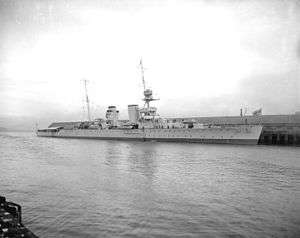HMS Raleigh (1919)
 HMS Raleigh visiting Vancouver in 1921. | |
| History | |
|---|---|
| Name: | Raleigh |
| Namesake: | Sir Walter Raleigh |
| Ordered: | 12 December 1915 |
| Builder: | William Beardmore & Company, Dalmuir |
| Laid down: | 9 December 1915 |
| Launched: | 28 August 1919 |
| Commissioned: | 1921 |
| Struck: | 1926 |
| Fate: | Wrecked off Point Amour, Strait of Belle Isle, Labrador, 8 August 1922 |
| General characteristics | |
| Class and type: | Hawkins-class heavy cruiser |
| Displacement: |
|
| Length: | |
| Beam: | 58 ft (18 m) (65 ft (20 m) across bulges) |
| Draught: | 17.25 ft (5.26 m) (20 ft 6 in (6.25 m) full load) |
| Installed power: | 70,000 shp (52,000 kW) |
| Propulsion: |
|
| Speed: | 31 kn (36 mph; 57 km/h) |
| Range: | 5,400 nmi (10,000 km) at 14 kn (16 mph; 26 km/h)[1] |
| Capacity: | 2,186 tons oil fuel |
| Complement: | 690 (standard),[1] 800+ (wartime) |
| Armament: |
|
| Armour: |
|
HMS Raleigh was a Hawkins-class heavy cruiser of the Royal Navy. She was commissioned as part of the British North Atlantic squadron in 1921. Within in a year of commissioning the ship was written off after having run aground off Labrador. The vessel was eventually destroyed with explosives in 1926.
Design
She had a full load displacement of 12,000 long tons (12,000 t) (light, 9,700 long tons (9,900 t)), an overall length of 605 ft (184 m), and carried a complement of 700 officers and men. She was the only ship of the Hawkins class to be completed with 70,000 shp (52,000 kW) machinery; on trials off Isle of Arran from 7–9 September 1920, she reached her designed speed of 31 kn (36 mph; 57 km/h) at full power of 71,350 shp (53,210 kW). At half power, 35,000 shp (26,000 kW), she still managed to make 28 kn (32 mph; 52 km/h).[2] After trials the ship proceeded to Devonport for completion as a flagship.

Service history
In April 1922, Sir William Christopher Pakenham was Admiral of the Royal Navy's North America and West Indies Station and he designated Raleigh as his flagship. Sir Arthur Bromley was the captain of Raleigh and it was through his negligence that the ship was lost.[3] On 8 August 1922, Captain Bromley sped the flagship through thick fog and ran her aground at L'Anse Amour, Newfoundland and Labrador. Eleven sailors were drowned in the shipwreck.
The ship was a total write-off. The ship remained hard aground and upright for four years. During this period, she was stripped of all salvageable items and was then destroyed with explosives in September 1926.[4]
The residents of L'Anse Amour conduct an annual re-enactment of the event on the anniversary of the disaster.[5]
Notes
- 1 2 3 4 5 Whitley 1995 p.77
- ↑ Raven and Roberts, British Cruisers of World War Two (London: Arms & Armour Press, 1980), p. 60, note the 31 knot full speed but state that the other details of the trials are not known. In fact the trials were written-up in detail in Engineering, issue of 24 September 1920.
- ↑ Bromley and his navigating officer, Commander L.C. Bott were both court martialled and found negligent in their duty; they were subsequently reprimanded and discharged. See Rohmer. See also: UK National Archives
- ↑ M. J. Whitley, Cruisers of World War Two: An International Encyclopedia (London: Arms & Armour Press, 1995), p. 80 states that Raleigh was blown up in July 1928 by a party from HMS Calcutta.
- ↑ "HMS Raleigh Re-enactment"
References
- Whitley, M. J. (1995). Cruisers of World War Two. Great Britain: Brockhampton Press. ISBN 1-86019-874-0.
- Rohmer, Richard (2003). 'Raleigh' on the Rocks: The Shipwreck of HMS 'Raleigh'. St. John's: Creative Publishing.
Further reading
- Extract from the diary of Vice Admiral Sir Stephen Carlill, KBE, CB, DSO "The Wreck of HMS Raleigh", Naval Review, 1983.
External links
| Wikimedia Commons has media related to HMS Raleigh (1919). |